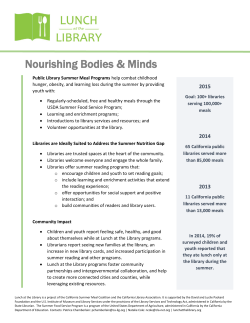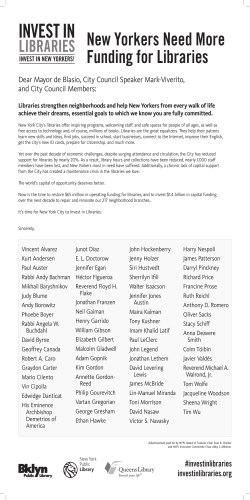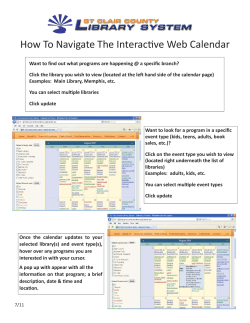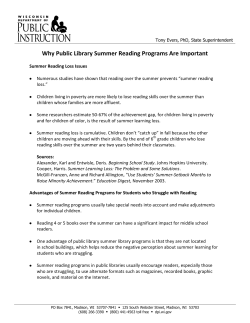
IPLC 2015 FINAL RECOMMENDATIONS â DRAFT
March 17-19, 2015, India International Centre, New Delhi IPLC 2015 FINAL RECOMMENDATIONS – DRAFT (For private circulation and comments) 1. Public libraries in India should make every effort to conform to the guidelines prescribed by UNESCO in its Public Library Manifesto. i. Public libraries will have to respond to the changing needs of the public, serve them with necessary information resources and contribute to developing a knowledge society. ii. Library services should cut across gender, language, literacy and age barriers so as to make libraries, spaces for ‘social inclusion’. iii. The community should have a say in the functioning of individual libraries; and, carrying out community needs assessment and their satisfaction level must be made an annual feature of every public library. iv. The community should be the focus of collection/service development of each library. v. Public libraries should conform to UNESCO guidelines and look after the communities besides books and journals. vi. Every district library should be linked to all the rural and branch libraries in the district in a hub and spokes model with responsibilities to support, nurture and promote service delivery. vii. Libraries should offer physical and content access to people with disabilities on the basis of their special needs. viii. Libraries should involve the communities served in the management and monitoring of services. ix. Creating and strengthening reading habit among the communities, especially among the children, should be one of the main objectives of every public library. 2. Model Public Library Act/guidelines should be developed. i. Developments in ICTs in changes in society are transforming every facet of every public service. Taking these into consideration, Ministry of Culture (MoC), Govt. of India, should develop a new model public library act or a broad set of guidelines for the effective management and sustainability of public libraries, which the states should be encouraged to follow. ii. There are major variances in the practice of public librarianship amongst the different states in India. The Ministry of Culture should develop some basic guidelines to ensure the minimum service standards and certain accountability mechanism for the provision of public library services. iii. The States that have enacted public library legislation should be encouraged to implement the provisions of the legislation. 3. The apex body, Raja Rammohun Roy Library Foundation, requires remodeling and reshaping with multi-stakeholders engaged in the process. i. There needs to be a national body to provide leadership to the public library system in the country. The MoC may consider restructuring and strengthening the Raja Rammohun Roy Library Foundation to undertake this new role. ii. The Raja Rammohun Roy Library Foundation should be encouraged to develop a Forum where multi-stakeholders are asked to support the organization. iii. A cost-benefit analysis of RRRLF schemes is required to be carried out to assess its effectiveness. iv. RRRLF functionaries require to be supported with the capacity they require to manage the Indian Public Library System, reporting to a multistakeholder group, and that their capacity development should be modeled on other national systems around the world. 4. An India Public Library Fund (IPLF) should be created to make way for funding support from public and private sources. i. Ministry of Culture should establish an India Public Library Fund (IPLF) on a priority basis, and such a Fund should be managed by multi-stakeholders. ii. IPLF should attract funds from various resources, including that of tapping the 2% CSR funds in the Companies Act. iii. IPLF should seek contributions from various central ministries which directly or indirectly benefits substantially from public library services such as the iv. Ministry of Human Resources Development, Ministry of Rural Development, Ministry of Women and Child Development and the Ministry of Skill Development. The Ministry of Culture should help obtain IT exemption for individuals who donate funds to IPLF. 5. An India Public Library Association/Council requires to be formed. i. India Public Library Association/Council, led by the library professional should be established towards strengthening all public libraries in the nation, and, should include all stakeholders of public libraries. ii. All stakeholders of public libraries should be encouraged to join the association/council as members and associate members. iii. IPLA/C should be recognized by the Ministry of Culture as a professional body that helps to improve, innovate and steer the public library movement responding to the changing needs of the community. iv. Considering such public library associations have been found to be effective for the development of public library system in various nations, the Ministry of Culture should pro-actively encourage setting up of similar associations in India. v. State level stakeholders should be encouraged towards establishing statespecific associations, and all such state level associations should be encouraged to be a part of the IPLA. 6. An India Public Library Campaign should be initiated by the Public. i. Media houses, citizens, the private sector and the government to spearhead the movement to create awareness on the use of public libraries. ii. A concerted effort to engage citizens, encourage corporate involvement to tap resources, including that of tapping the 2% CSR funds. 7. Community needs and aspirations should form the basis of service/collection development; hence, a judicious blend of centralized/ decentralized procurement is to be encouraged. i. Public libraries should respond to the changing needs of the communities by engaging them as well as fulfilling the same with services that are demands-driven. ii. Public libraries should be supported to develop its collection/holdings that are relevant to the needs of the specific population, each public library serves. iii. The current system of collection development, managed by the RRRLF is totally ineffective. A blend of centralized/ decentralized purchasing of library materials should be developed to meet the needs of the community. iv. While the local stakeholders of each of the libraries should have a say in the collection/service development plans, to optimize resources, the state level administrative bodies should develop a transparent and user-centred procurement process. v. While books, including the text books should be purchased by public libraries, non-book materials such as tablets, eBooks, and other audio and video collections should also be included in the procurement policies. vi. Access to online resources and library networks should be introduced in public libraries as a priority. The Ministry of Culture and RRRLF have to immediately look into the resource needs of the libraries supported by them. vii. All public libraries should initiate special services aimed at children, with materials that promote joyful learning techniques among them. viii. All public libraries should serve people with disabilities and those with special needs. ix. While purchasing digital material, all public libraries should adhere to international access and usability standards such as WACG 2.0, ePub3 accessibility guidelines and those materials in Unicode format to ensure accessibility by all including the print-disabled. x. A policy for weeding books/reading materials should be developed and implemented. 8. Refurbishment of Public libraries should be carried out throughout the nation on a priority basis. i. Library should become inviting places for reading, reference and research in commensurate with the local environment. The national body to oversee the functioning of public libraries should develop prototypes and adopt already established standards to suit different types of public library environments. ii. The Ministry of Culture should issue guidelines to ensure that public libraries are accessible to all including persons with disabilities by providing infrastructure and relevant content useful for all segments of the society. iii. A specially designed children’s corner/section should be an integral part of each and every public library. iv. All public libraries should have proper seats, reading tables, flooring, lights, and facilities like drinking water and toilets to facilitate public to spend some creative time in libraries. v. Public libraries need to redesign their library spaces to attract 21st century users. Innovative approaches to redesigning the public space should be considered with the help of professionals and architects and there should be a redesign competition engineered, specially aimed at public libraries. 9. All public libraries should offer free WIFI and Internet access and all relevant web resources. i. All Public libraries in India are to be connected to the National Knowledge Network, with 1GBPS bandwidth and resources that are accessible to all members of the community. ii. All public libraries should be equipped with ICT infrastructure that includes appropriate hardware, software, internet access, digital archival facilities in all public libraries. iii. Cataloguing of resources available in public libraries should get made in machine readable form. iv. State Centre Libraries and District Libraries must be modernized as a priority, and that these libraries should connect with all libraries in their districts in a hub and spokes model. v. All important and rare copyright-free publications should be digitized through national and private agencies specialized in the job. 10. State Governments should make provisions to organize regular training programs to equip library professionals with right skills, knowledge and attitude for the future. i. In coordination with various training providers and professional public library associations and institutions, continuous professional and leadership development so also skill-development program should be regularly designed and implemented. ii. Every library professional must undergo a minimum of ten days of training each year, and be assessed on the basis of a performance assessment criterion. iii. There is an urgent need for upgrading curriculum in library schools for preparing public library professionals for the future. iv. Performance based incentives should be considered for the staff in public libraries. v. Public library training modules should be evolved to look into specific requirements in different states. vi. States that provide training in regional languages should ensure that latest best ICT content becomes available in the vernacular for use by the library staff. ******************************
© Copyright 2026









